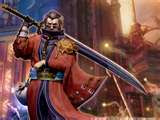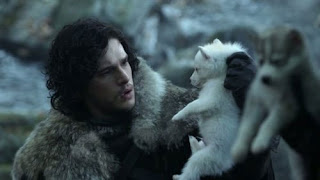 |
| So much WANT. |
Am I reusing a picture of Jon Snow? Why yes. Yes I am. Can you blame me, though?
Also, can you tell I'm in severe Game of Thrones withdrawal? Cuz I am.
Anyway, I keep picking GoT because a) it's awesome, b) it allows me to use gratuitous Jon Snow photos, and c) I just finished it last night and OH MY GAWD.
And it's a fantastic example of worldbuilding and how the world you create impacts your characters, something I covered briefly in the
last post but wanted to expound upon because it's kiiiiiind of important.
And I'm going to use Jon as an example ^_^
In Westeros, a bastard's surname is typically called by region. In the northlands, where Ned takes Jon, that surname is "Snow." In the river region, the name is "Rivers." You can see how that works, I'm sure.
When Ned brings Jon to Winterfell, no one can understand why, including Jon. Step-mom Catelyn despises him and little half-sister Sansa (who kinda sucks at life anyway) never accepts him into the family. He's called "bastard" as often as "Jon." So...how does all this fit into the worldbuilding?
Because of the cultural and societal implications of Jon's standing, he's seen as little more than a parasite. Alienated and alone, no matter how hard Arya, Robb, Bran, and Ned try to make him feel included, he's not. Never seated with his family at banquets, never allowed to take the name "Stark," Jon has no true family, though he'd die for Ned or his half-siblings without a second thought. So, where do men with no hope of establishing a house go?
TO THE WALL.
 |
| BRRRRRRRR. |
The Wall is where bastards, some nobles (like poor Sam Tarly who is a horrible disappointment to his father) , rapists, murderers, thieves and other low-born ilk have a chance to make something of themselves defending the northernmost part of the Kingdom from...well, lots of things. Jon's uncle Benjen "took the black" himself, and it's through him Jon learns of the opportunity and decides to go himself.
Like most fraternities (not Phi Kappa Gamma, beer-guzzling fraternities, but actual brotherhoods) a committal vow is required of all new initiates. It's this vow, and its importance within the world, that compels Jon to stay when he doesn't want to. Deserters from the Wall are as good as dead. In fact, in the beginning of Game of Thrones (book or movie), the first scene with the Starks is Ned beheading a deserter from the Wall. Makes Jon think twice a little bit, and thusly affects his decisions and thought-process.
So, how do you apply this to your world?
What George RR Martin did with Jon (and really, I could go on for weeks just on Game of Thrones alone) is he took the time to figure out how the world affects his character. What's true in both fiction and life is that our upbringing and the society in which we're brought up affects us as we get older. The key is deciding how your world dictates your character and whether your character chooses to rise above it.
Case in point: Katniss Everdeen. Yes, I KNOOOOW but I loved the Hunger Games. So anyway, here's what society dictates for Kat: Be poor, participate in Hunger Games, die.
What did she do? *SPOILER*
She takes down the freaking President. Not herself, mind you. She misses the important action *GRRR*. But rather than take everything lying down, Kat becomes a symbol of hope for an oppressed people. She rises above the expectations set for her.
That's all well and good for the protagonist/main character/whatever, but since it's hard to pinpoint a main character in Martin's multi-POV epic, I kinda consider Jon to be more of a secondary character. He's important enough to warrant his own POV, sure, but in the end, the book finds its focus around the Lannisters vs. the Starks, and Jon's got bigger (and undeader) fish to fry.
This leads into using your world to round out your secondary characters too. We'll discuss that at a later date ;)
 Today, we have Auron. I. LOVE. AURON. He's one of the best characters from ANY series I've played and I have a total thing for him. Why?
Today, we have Auron. I. LOVE. AURON. He's one of the best characters from ANY series I've played and I have a total thing for him. Why?
























